Edwin Porter wrote the first book on the Lizzie Borden killings. Help honor his memory.
- Oops!Something went wrong.Please try again later.
FALL RIVER — By the time Edwin H. Porter was 30 years old, he'd traveled the country, had multiple careers, been a journalist for several newspapers, and written a stunning book about the crime of the century: the Lizzie Borden murder case.
His life didn’t last much beyond that — he died in 1904, at age 39, and was buried in an unmarked grave in St. Patrick’s Cemetery in Fall River.
Porter was a reporter for the Fall River Daily Globe, and his book, “The Fall River Tragedy: A History of the Borden Murders,” is a groundbreaking work of both history and journalism. Published only two months after the trial, his was the first book-length work written on the case, notable for its stark realism and attention to detail. It generated significant controversy in its time, fueling rumors that linger even today.
It’s an injustice that his grave has no stone, said author, historian and Borden expert Stefani Koorey. She’s started a GoFundMe campaign to raise the money to finally buy a marker for Porter, one that will honor his memory and his legacy. The campaign has a $2,800 goal.
“It is a barren place where the body of Edwin Porter lies,” Koorey said. “And nobody knows he’s there.”
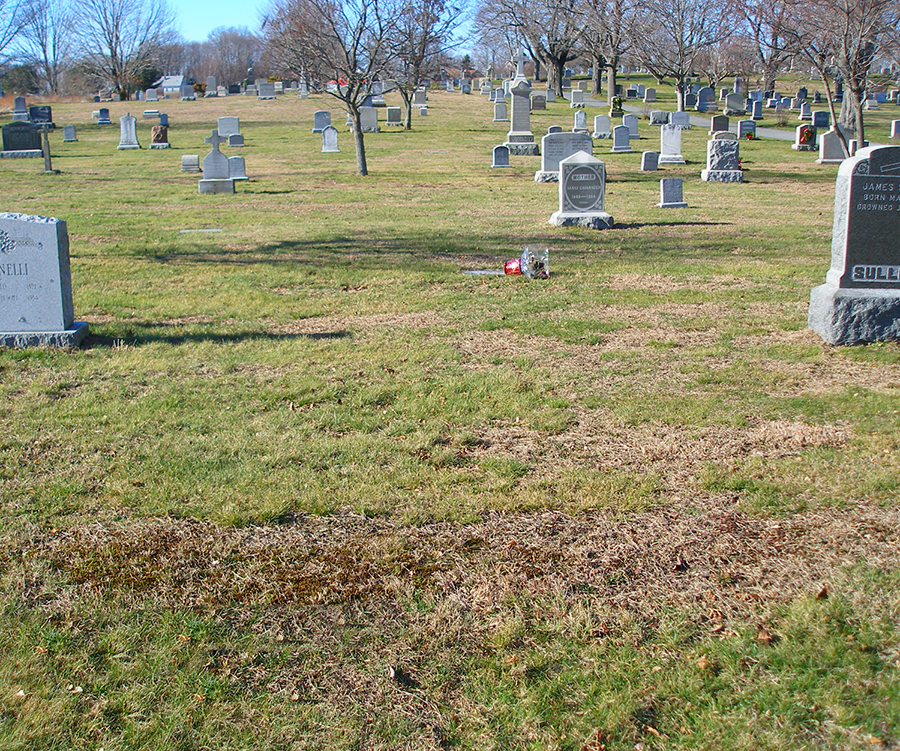
Still infamous after all these years: Here's why Fall River's legend of Lizzie Borden will never die
How Edwin Porter became a writer
Porter suffered from tuberculosis for years. When he died, Koorey said, he was such a respected figure in the journalism community that even rival papers to the Globe published glowing obituaries.
“His specialty was police work and there was none who excelled him in that branch of the service,” wrote the Fall River Daily Herald of Feb. 29, 1904. “There was none who worked more zealously to obtain a ‘story,’ exclusive or otherwise, than he.”
Porter was born in Glasgow, Kentucky, in October 1864, with a dedication to criminal justice apparently in his blood — his father was the county sheriff. He taught school for a few terms while learning the printer’s trade, and founded a weekly newspaper in North Dakota. But he also had a yen to travel and a nose for a great story, and found himself over the next years reporting for papers in Louisville, Chicago, and even in Pennsylvania covering the infamous 1889 Johnstown Flood. He came east to Providence, writing for the now-defunct Providence Telegram, and to Fall River as the city editor of the Fall River Daily Tribune, a paper published only briefly in 1890. He then joined the Globe as its crime reporter. He was about 25 years old.
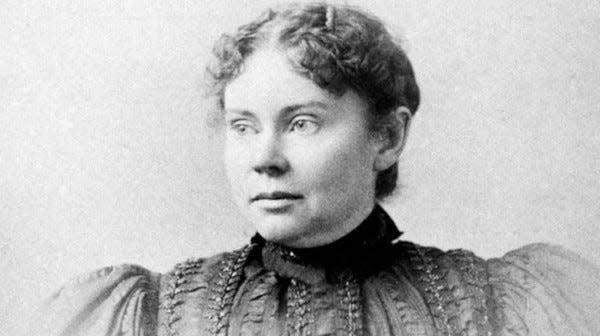
Learn more about the case: Where to start your Lizzie Borden studies, with books and films
Covering the trial of the century: the Lizzie Borden killings
On Aug. 4, 1892, Porter had a front-row seat to the brutal hatchet killings of Andrew and Abby Borden, as one of the first people at the murder scene on Second Street. A major story had fallen into his lap, and he knew it.
Porter covered the case extensively and published nearly daily updates from the trial through June 1893, reporting on the country’s most notorious homicide with diligence, professionalism and clarity. With lightning speed he finished and published his book, “The Fall River Tragedy,” only two months after the trial, literally ripped from the headlines.
“It was published locally,” Koorey said, "and he got into trouble.”
Lizzie Borden’s defense lawyer Andrew Jackson Jennings “knew that this thing was coming out. In fact, [Porter] had announced that it was coming out in January, way before the trial started. And he was sent a letter by Jennings saying, ‘you can’t defame her, you can’t say anything that isn’t true, you can’t use any pictures of the family or me in this book.’”
The Jennings Journals: Fall River Historical Society's new book could have Lizzie Borden fans rethinking theories
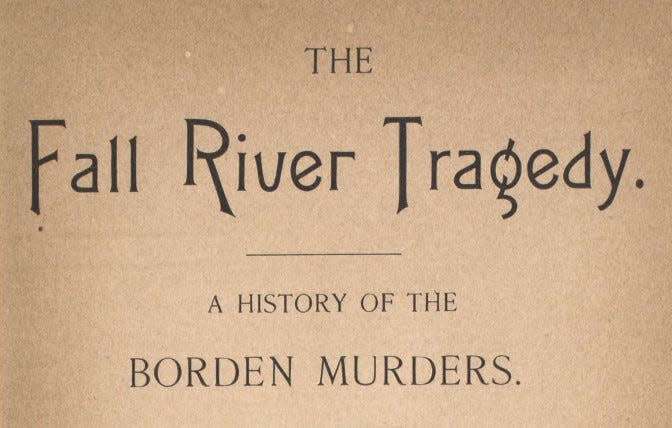
Porter's book was strictly based on the facts of the case and trial, but he agreed to use no photos of living Borden family members, including Lizzie. The book was controversial upon release, as would be expected coming so quickly after the incident, but was considered essential to understand a case that even then sparked endless legend and speculation.
Porter was caught up in some of that rumor-mongering himself — years after his death, at the hands of true-crime writer Edmund Pearson, who wrote about the Borden case.
“[Pearson] is the one that started this … story that Lizzie had bought up all the copies [of ‘The Fall River Tragedy’] and had them destroyed, and that’s why you can’t find any of them. And every author after that repeats it," Koorey said. “And it’s not true — none of it’s true.”
After Porter’s death, the Globe predicted that his book “will be read with interest long after the author’s passing.” They were correct. It’s still a vital, primary text for people interested in Lizzie, easily available in print 130 years later, and since it’s in the public domain free online from multiple sources.
A rare piece of memorabilia: Lizzie Borden letter delivered 126 years later — to the Fall River Historical Society
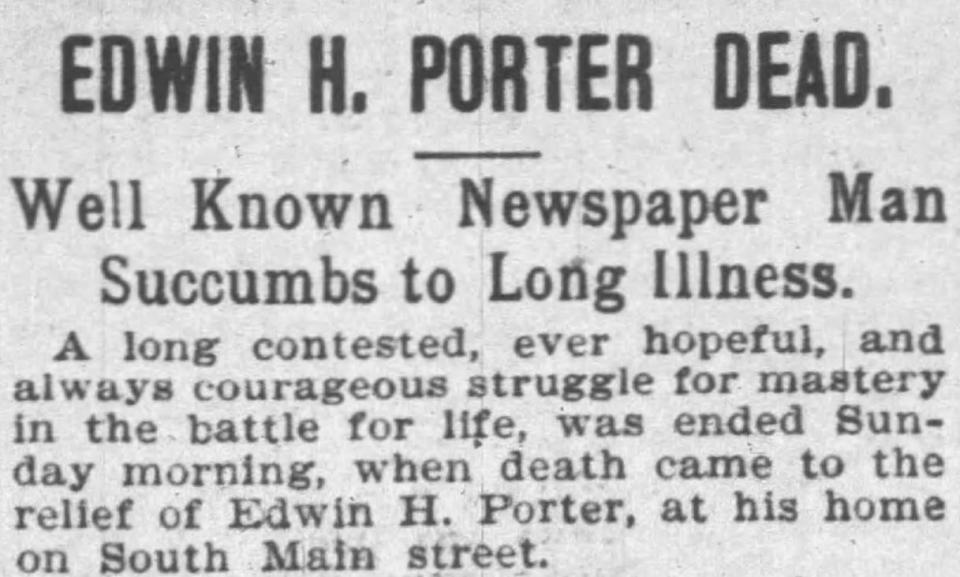
Why Porter's grave went unmarked, and how you can help honor him
When Porter died in 1904, he left a wife, Winifred Alice, and two daughters, Florence and Winifred Alice, ages 12 and 5. The family didn’t fare well.
“The Porters were extremely poor following the early death of the breadwinner," said Koorey.
They had no money to buy him a gravestone, so he lay beneath a bare patch of ground at St. Patrick’s Cemetery. When his daughter Winifred died in 1919, also too young at age 20 and also of tuberculosis, she was buried in the same grave.
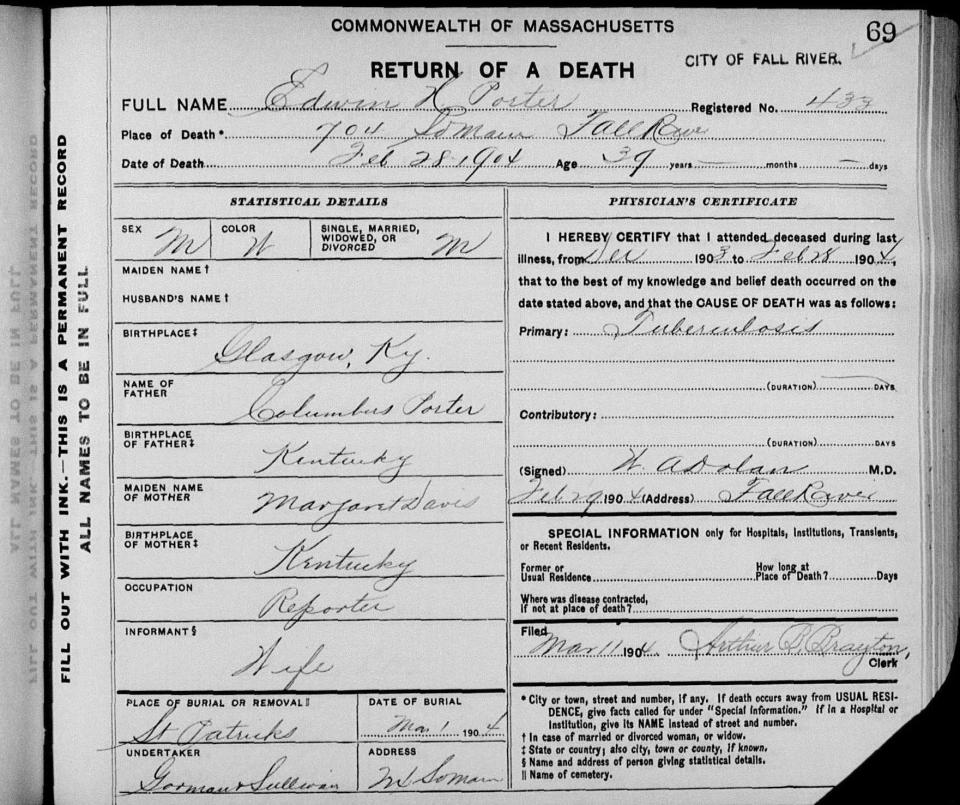
Koorey said her friend Sherry Chapman, author of “Lizzie Borden Resurrections,” was doing book research when she discovered that not only did Porter not have a headstone, but his family owed the cemetery $320. The office told Chapman if she paid off that debt, “then you can own the grave,” Koorey said. “And so she did.”
Now Koorey is raising funds to finally honor Porter with a headstone.
“The headstone, purchased from Rex Monumental Works in Fall River, will be a black granite slope stone, engraved by laser, and depict the open pages of a book to signify his career as an author and journalist," Koorey said.
The goal is $2,800, with funds going to cover the stone, tax, permit, foundation and perpetual care. Any money raised above the goal will be donated to charity.
Donors can also send checks, payable to PearTree Press, to PearTree Press, PO Box 3324, Westport, MA, 02790.
Donors can remain anonymous if they wish.
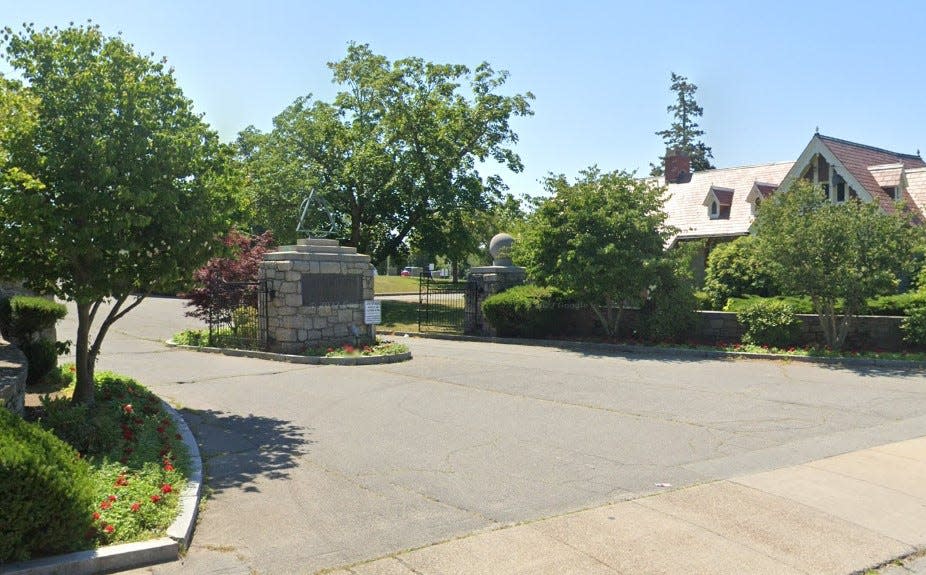
As of June 28, donors have contributed $615.
Beyond being a writer whose work is still studied today, Porter was by all accounts a good-natured, courteous man who adopted Fall River as his home. Though Fall River‘s newspapers had a fierce rivalry, to a one they acknowledged that Porter was a professional who never betrayed the confidence of sources and earned their respect — “a typical southern gentleman,” according to the Daily Evening News.
“It is time for Edwin H. Porter to be remembered in stone," Koorey said.
Become a subscriber today! We have a great introductory offer for new subscribers: https://www.heraldnews.com/NewsSale
Dan Medeiros can be reached at dmedeiros@heraldnews.com. Support local journalism by purchasing a digital or print subscription to The Herald News today.
This article originally appeared on The Herald News: GoFundMe to buy headstone for Lizzie Borden book writer Edwin Porter

